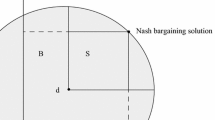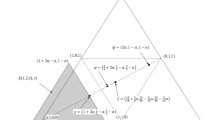“For they (philosophers) conceive of men, not as they are, but as they themselves would like them to be. Whence it has come to pass that, instead of ethics, they have generally written satire…”—Spinoza, Tractatus Politicus (1677).
Abstract
There are two fundamental problems for instituting a social contract. The first is cooperating to produce a surplus; the second is deciding how to divide this surplus. I represent each problem by a simple paradigm game, a Stag Hunt game for cooperating to produce a surplus, and a bargaining game for its division. I will discuss these simple games in isolation, and end by discussing their composition.
Similar content being viewed by others
References
Alexander JM (2007) The structural evolution of morality. Cambridge University Press, Cambridge
Alexander JM, Skyrms B (1999) Bargaining with neighbors: is justice contagious? J Philos 96:588–598
Blume A, Ortmann A (2007) The effects of costless pre-play communication: evidence from games with Pareto-ranked equilibria. J Econ Theory 132:274–290
Cole T (1967) Democritus and the sources of Greek anthropology. American Philological Association, Cleveland
Cooper RC, De Jong D, Forsythe R, Ross T (1992) Communication in coordination games. Quart J Econ 107:771–793
Eshel I, Samuelson L, Shaked A (1998) Altruists, egoists and hooligans in a local interaction model. Am Econ Rev 88:157–179
Foster D, Young HP (1990) Stochastic evolutionary game dynamics. J Theor Biol 38:219–232
Hume D (1739) In: Norton DJ, Norton MJ (eds) (2011) A treatise of human nature. Oxford University Press, Oxford
Kandori M, Mailath G, Rob R (1993) Learning, mutation and long-run equilibria in games. Econometrica 61:29–56
Nowak M, May RM (1992) Evolutionary games and spatial chaos. Nature 359:826–829
Nydegger RV, Owen G (1974) Two-person bargaining: an experimental test of the Nash axioms. Int J Game Theory 3:239–249
Pacheco J, Santos F, Souza M, Skyrms B (2009) Evolutionary dynamics of collective action in N-person Stag Hunt dilemmas. Proc R Soc B 276:315–321
Page T, Putterman L, Unel B (2005) Voluntary association in public goods experiments. Econ J 115:1032–1053
Pemantle R, Skyrms B (2004) Network formation by reinforcement learning: the long and the medium run. Math Soc Sci 48:315–327
Pollock G (1989) Evolutionary stability of reciprocity in a viscous lattice. Soc Netw 11:175–212
Rand D, Arbesman S, Christakis N (2011) Dynamic networks promote cooperation in experiments with humans. PNAS 108:19193–19198
Robson A (1990) Efficiency in evolutionary games: Darwin, Nash and the secret handshake. J Theor Biol 144:379–386
Roth AE (1995) Bargaining experiments. In: Kagel J, Roth AE (eds) Handbook of experimental economics. Princeton University Press, Princeton, pp 253–348
Roth AE, Malouf M (1979) Game theoretic models and the role of information in bargaining. Psychol Rev 86:574–594
Rousseau JJ (1755) Discourse on inequality. Oxford University Press, Oxford
Santos FJ, Pacheco J, Lenaerts T (2006) Cooperation prevails when individuals adjust their social ties. PLoS Comput Biol 2(10):e140
Santos F, Pacheco J, Skyrms B (2011) Coevolution of pre-play signaling and cooperation. J Theor Biol 274:30–35
Skyrms B (2002) Signals, evolution and the explanatory value of transient information. Philos Sci 69:407–428
Skyrms B (2004) The Stag Hunt and the evolution of social structure. Cambridge University Press, Cambridge
Skyrms B, Pemantle R (2000) A dynamic model of social network formation. Proc Natl Acad Sci USA 97:9340–9346
Taylor M, Ward H (1982) Chickens, whales and lumpy goods: alternative models of public goods provision. Political Stud 30:350–370
Van Huyck J, Battalio R, Mathur S, Ortmann A, Van Huyck P (1995) On the origin of convention: evidence from symmetric bargaining games. Int J Game Theory 24:187–212
Verlinsky A (2005) Epicurus and his predecessors on the origin of language. In: Frede D, Inwood B (eds) Language and learning: philosophy of language in the Hellenistic age. Cambridge University Press, Cambridge, pp 56–100
Wagner E (2012) Evolving to divide the fruits of cooperation. Philos Sci 79:81–94
Young HP (1993) An evolutionary model of bargaining. J Econ Theory 59:145–168
Young HP, Burke M (2001) Competition and custom in economic contracts: a case study in Illinois agriculture. Am Econ Rev 91:559–573
Author information
Authors and Affiliations
Corresponding author
Rights and permissions
About this article
Cite this article
Skyrms, B. Natural Social Contracts. Biol Theory 8, 179–184 (2013). https://doi.org/10.1007/s13752-013-0113-3
Received:
Accepted:
Published:
Issue Date:
DOI: https://doi.org/10.1007/s13752-013-0113-3




